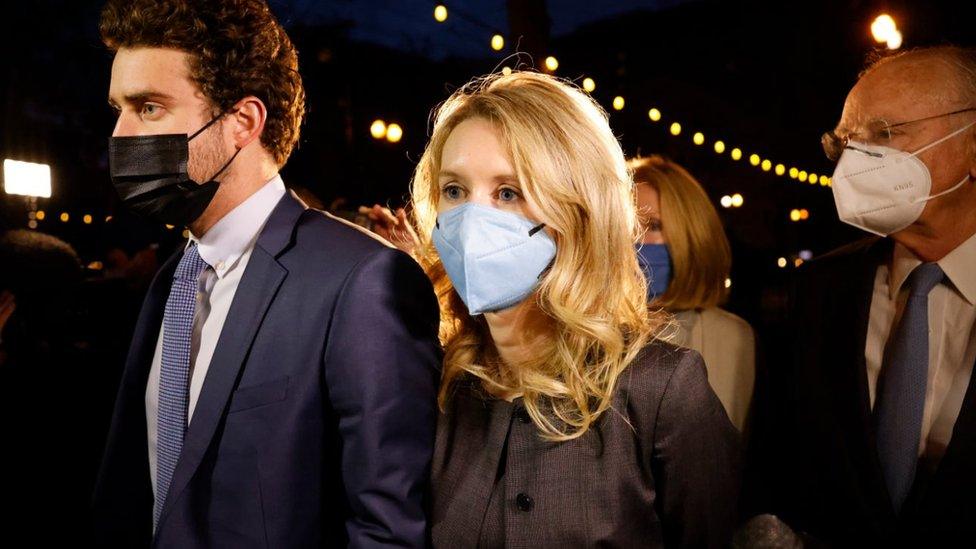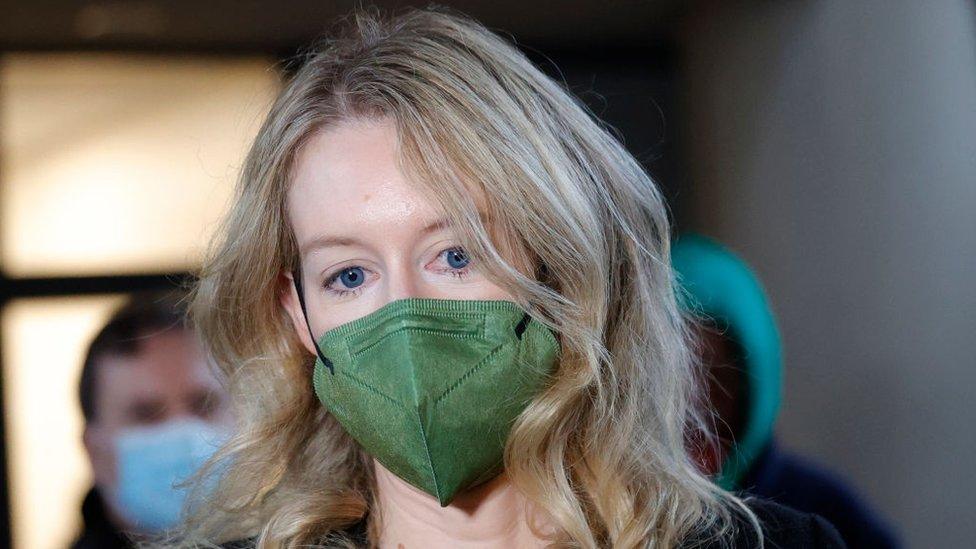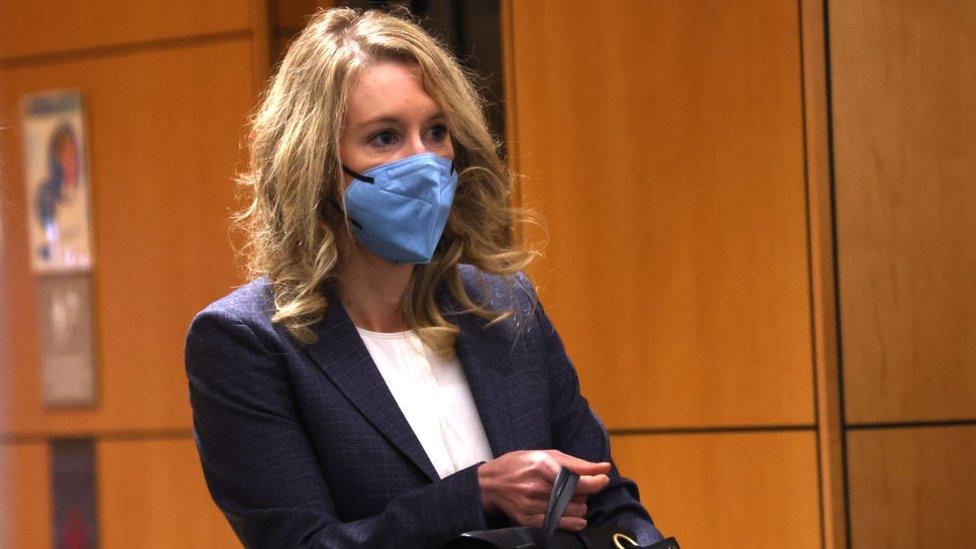Elizabeth Holmes: Theranos founder convicted of fraud
- Published

Holmes (centre) remains on bail before sentencing at a later date
Theranos founder Elizabeth Holmes has been convicted of defrauding investors after a months-long landmark trial in California.
Prosecutors said Holmes knowingly lied about technology she said could detect diseases with a few drops of blood.
Jurors found Holmes guilty of conspiracy to commit fraud against investors and three charges of wire fraud.
She denied the charges, which carry a maximum prison term of 20 years each.
Holmes was not taken into custody, with no date confirmed yet for sentencing and a further hearing scheduled next week.
Journalists inside the courtroom said the 37-year-old, who gave birth to her first child last year, showed little emotion when the verdicts were read out, and hugged her husband, Billy Evans, and her parents before leaving the courtroom.
Holmes faced 11 charges in total and was found not guilty of four charges relating to defrauding the public.
The split verdict came after the judge said the jury, having deliberated for seven days, could deliver a partial verdict after being unable to reach consensus on another three counts.
The three wire fraud charges she was found guilty of are tied to specific investors in her failed company. Wire fraud is a relatively wide-ranging federal crime in the US, which involves using electronic communications, such as emails, to make false statements to get something from another person - usually money.
Theranos, at one point valued at $9bn (£6.5bn), was once the darling of biotech and Silicon Valley.
Holmes was able to raise more than $900m from billionaires such as media magnate Rupert Murdoch and tech mogul Larry Ellison.
The firm promised it would revolutionise the healthcare industry with a test that could detect conditions such as cancer and diabetes with only a few drops of blood.
But these claims began to unravel in 2015 after a Wall Street Journal investigation reported that its core blood-testing technology did not work.
For nearly four months at trial, the jury of eight men and four women were presented with two starkly different accounts of the former self-made billionaire, whose downfall shook Silicon Valley.
Calling some 30 witnesses, the prosecution sought to prove that Holmes knew the product she was selling to investors - a machine called the Edison - was a sham, but remained hell-bent on the firm's success.
Her company secretly relied on commercially available machines to run the tests, prosecutors said.
At trial, multiple lab directors testified to telling Holmes about the flaws in Theranos' technology but being instructed to downplay their concerns. At the same time, they added , Holmes told investors the technology was operating as planned.
Holmes "chose fraud over business failure. She chose to be dishonest with investors and patients", said prosecutor Jeff Schenk in closing arguments. "That choice was not only callous, it was criminal."
The defence countered with descriptions of a dedicated and driven businesswoman, making waves in a male-dominated industry.
The rise and fall of Elizabeth Holmes
Testifying in her own defence, Holmes acknowledged mistakes in Theranos' operation, but maintained she never knowingly defrauded patients or investors.
The defence also laid blame on Ramesh "Sunny" Balwani, her former business partner and ex-boyfriend.
At trial Holmes accused Mr Balwani, 19 years her senior, of emotional and sexual abuse - allegations he denies.

Reverberations for Silicon Valley

Elizabeth Holmes claimed her diagnostics machines could test hundreds of diseases. They couldn't.
Considering she was the founder and CEO of Theranos you might think the case would be an easy win for the prosecution. But for a number of reasons the guilty verdicts were by no means assured.
These technical fraud cases are extremely difficult to prosecute. Jurors were asked to consider hundreds of documents and sit through evidence from dozens of witnesses.
Holmes has just had a baby and some commentators believed she would strike a sympathetic character.
The difficulty in successfully prosecuting Holmes is reflected in the verdicts - a real mixed bag of decisions from the jury.
But considering how difficult white-collar fraud cases are to prosecute, the government will be happy with what stuck.
Her former partner, Sunny Balwani, will now face trial next month in the same court for similar charges. It's likely Holmes will not be sentenced until after that case has concluded.
The verdict sends a clear and frank message to Silicon Valley founders - there are consequences when you say things to investors that aren't true.

US Attorney Stephanie Hinds thanked the jurors who, she said, had navigated a "complex case" over 15 weeks to reach their verdict.
"The guilty verdicts, in this case, reflect Ms Holmes' culpability in this large-scale investor fraud and she must now face sentencing for her crimes," the prosecutor said in a statement read out by an assistant.
Holmes was dubbed the "next Steve Jobs" by Inc. magazine, trumpeted by Forbes as being "the world's youngest self-made female billionaire", and featured in Time magazine's coveted list of the most influential people in 2015.
She founded Theranos as a teenager, shortly after dropping out of chemical engineering at Stanford University.
The firm officially ceased operations in 2018 following the scandal.
Related topics
- Published8 December 2021

- Published18 December 2021
